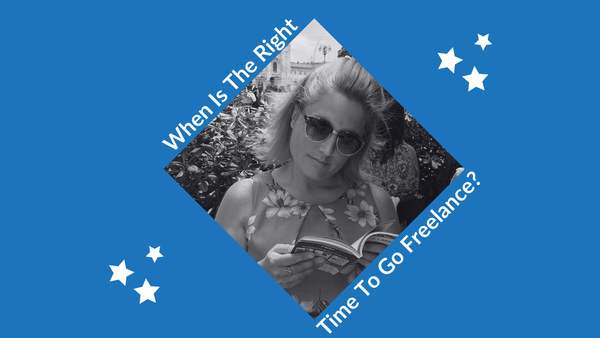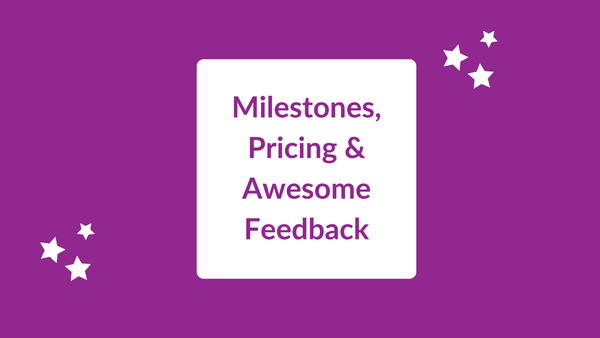You Get To Decide What Success Looks Like
Your business is your business, and it doesn’t matter what everyone else is doing or not doing. You get to decide what success looks like for you.

When I started freelancing, I had no idea what I wanted my business to look like - all I knew was that I wanted to work for myself.
But shortly after leaving my job to go all in on self-employment, I went to an event. The speaker talked about the difference between being self-employed versus being a business owner.
He said something along the lines of: "Being self-employed means you have created a 'job' for yourself. Being a business owner means having a business that works without you."
For some reason, that stuck in my head - the idea that I needed to grow my business, build a team, and create something that worked without me.
This was reinforced by stuff I saw on LinkedIn.
"You need to build a business you can scale"
"You need to build a business you can sell"
"Stop exchanging time for money - create passive income"
It almost felt like being a one-person band meant you weren't seen as a proper business.
But every time I tried to put plans in place to grow or scale, I couldn't align them with the stuff I wanted to do.
Then one day it clicked for me - I was struggling because it wasn't really what I wanted.
I didn't want to spend 80 hours a week building a business empire.
I didn't need to earn six figures a month (or even a year) to be happy.
I didn't want to hire a team to do the stuff I enjoyed doing myself.
All I really wanted was to earn decent money doing the things I love for people I like.
So I stopped trying to do all those things people told me I "should" be doing and focused on what I actually wanted to do.
Once I did that, life got easier and my business started making me happy again.
And that's where the idea for my book, The Freelance Fairytale, came from - the idea that success is about having a business that makes you happy.
It's too easy to get distracted by other people's goals - other people's idea of what "success" means.
“You need to make six figures”
“You need to make seven figures”
“You need to scale”
“You need to grow your team”
“You need to create passive income”
“You need an exit plan”
But the truth is you don’t “need” any of those things if those things won’t make you happy.
So decide what you want and ignore what everyone else says you should want.
And stop comparing yourself to others.
You wouldn’t walk into a gym, look at the fittest, strongest, most toned and muscular person there, and expect to achieve the same look after a single workout (unless you’re deluded).
So why on earth would you compare your success to the success of others?
You aren’t the same. Your clients aren’t the same. Your skills and experience aren’t the same. Your goals aren’t the same.
You don’t know what support they’re getting in the background. Or whether they’re exaggerating their success stories.
You don’t know how long it took them to get to that point, how hard they had to work, or how much they invested.
You don’t know which bits of their business they’re not sharing on social media. Maybe they’re in a world of debt. Maybe they are working sixteen hours a day but barely making ends meet. Perhaps they are on the verge of burning out.
Your business is your business, and it doesn’t matter what everyone else is doing or not doing.
You get to decide what success looks like for you.
Are you set up for success?
I might not be earning six figures but I've structured my business so that I could.
My 12-week programme is currently £3000. So if I filled all three places every month, that would be £108,000 a year.
Even if clients were in the programme for an average of 16 weeks (taking into account holidays etc.), the most I'd be working with at once is probably 15. That's 15 hours a week on calls and let's say another 15 hours spent supporting my mentees between calls.
That's still only 30 hours a week.
Plus, my 12-week programme is only one income source. There's income from book sales, course sales, training and consulting work too. So I have the capacity to earn six figures if I want to.
And, being completely honest, if I was consistently filling all three spaces every month and had a waiting list, I'd increase the price and take on fewer clients.
The point is I can earn six figures without having to work ridiculous hours. Six figures is not out of reach for me. If I upped my marketing game a bit, I'm pretty confident, I'd be easily filling those spaces every month.
But I don't need to. I'm not chasing six figures. I actually quite like the balance I have right now. Some months I fill all three spaces, some months I don't.
Either way, my business is structured to allow me to earn enough to live comfortably, but I still have the capacity to earn more if I want to.
The mistake a lot of freelancers and small business owners make is getting their pricing wrong.
Filling your time with low-paying work will limit your ability to grow your business (if that's what you want) or create a well-balanced lifestyle. Being busy is not the same as being profitable.
Of course, if your goal is to work loads of hours for very little return, then crack on.
But I've never met anyone who has that as their goal.
So take a look at your business. Is it structured for success? Have you got the capacity to earn what you'd like or grow the way you want to?
If you're struggling with pricing, check out my article on how to price your services as a freelancer.
Did you know?
I offer 90-minute consultations for anyone who is overwhelmed, struggling, or just stuck in a rut with their freelance business.
Sometimes it can be tough figuring out where to start, what to try next, or what's going wrong. That's where I come in.
We'll look at your current marketing activities and sales process, work out where the gaps are and put together some actions to help you move forward.






